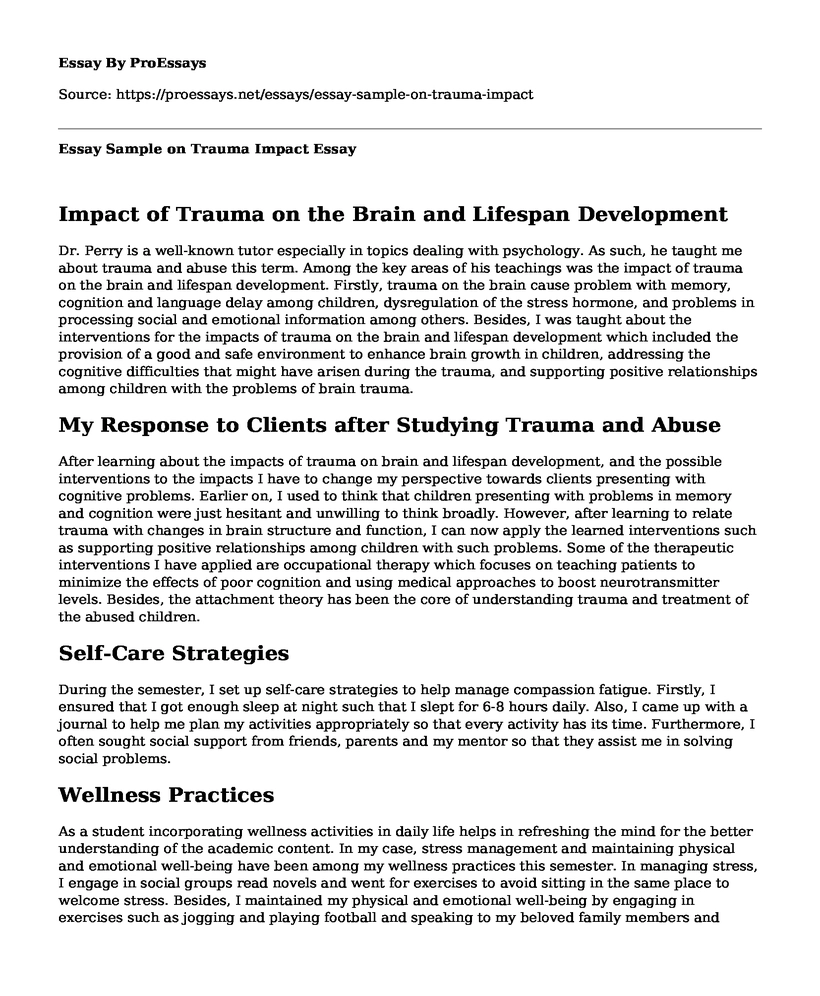Impact of Trauma on the Brain and Lifespan Development
Dr. Perry is a well-known tutor especially in topics dealing with psychology. As such, he taught me about trauma and abuse this term. Among the key areas of his teachings was the impact of trauma on the brain and lifespan development. Firstly, trauma on the brain cause problem with memory, cognition and language delay among children, dysregulation of the stress hormone, and problems in processing social and emotional information among others. Besides, I was taught about the interventions for the impacts of trauma on the brain and lifespan development which included the provision of a good and safe environment to enhance brain growth in children, addressing the cognitive difficulties that might have arisen during the trauma, and supporting positive relationships among children with the problems of brain trauma.
My Response to Clients after Studying Trauma and Abuse
After learning about the impacts of trauma on brain and lifespan development, and the possible interventions to the impacts I have to change my perspective towards clients presenting with cognitive problems. Earlier on, I used to think that children presenting with problems in memory and cognition were just hesitant and unwilling to think broadly. However, after learning to relate trauma with changes in brain structure and function, I can now apply the learned interventions such as supporting positive relationships among children with such problems. Some of the therapeutic interventions I have applied are occupational therapy which focuses on teaching patients to minimize the effects of poor cognition and using medical approaches to boost neurotransmitter levels. Besides, the attachment theory has been the core of understanding trauma and treatment of the abused children.
Self-Care Strategies
During the semester, I set up self-care strategies to help manage compassion fatigue. Firstly, I ensured that I got enough sleep at night such that I slept for 6-8 hours daily. Also, I came up with a journal to help me plan my activities appropriately so that every activity has its time. Furthermore, I often sought social support from friends, parents and my mentor so that they assist me in solving social problems.
Wellness Practices
As a student incorporating wellness activities in daily life helps in refreshing the mind for the better understanding of the academic content. In my case, stress management and maintaining physical and emotional well-being have been among my wellness practices this semester. In managing stress, I engage in social groups read novels and went for exercises to avoid sitting in the same place to welcome stress. Besides, I maintained my physical and emotional well-being by engaging in exercises such as jogging and playing football and speaking to my beloved family members and friends.
Pillars of Trauma Informed Care
There are three pillars of trauma-informed care to include, and they are used to ensure successful outcomes in children who have undergone trauma. They include giving the child a feeling of safety, establishment of connections, and enabling the clients to develop the ability to control their emotions (Raja, 2015). During the semester I interacted with several who had undergone trauma and since I had learned the three pillars, it easier for me to implement therapy for successful outcomes. I ensured that the clients are safe by being reliable to provide consistent care. Secondly, I established connections by availing all the needs for the clients including the presence of their relatives. Lastly, I taught them techniques in problem-solving so that they can manage their emotions.
Topic to Continue Learning
Among the topics discussed in class, I would like to continue learning "Trauma and Abuse." I will do this by researching more on the causes and effects of trauma so that I can be able to manage children with effects from trauma successfully.
Compassion Fatigue
Compassion fatigue is whereby those who care for others experience a reduction in the desire to care for them due to the feeling of being burdened or feeling secondary pain due to their suffering (Moeller, 2018). The situations that would put me at high risk of this condition include an increase in the number of trauma clients with advanced trauma-related problems and experiencing new cases of trauma-related problems. I think experiencing compassionate fatigue will be a state of despair, sympathy and frustration on my side.
Conclusion
I firmly believe that trauma can be overcome through effective therapy. In most cases, patients suffering from trauma find it hard coping with their immediate environment. This results in isolation which is very dangerous. It is imperative to talk to a family member when stressed or going through and psychological problems. This ensures that a person is in a position to vent and talk through the issues affecting them.
Reference
Moeller, S. D. (2018). Compassion fatigue. In Visual Global Politics (pp. 87-92). Routledge.Raja, S., Hasnain, M., Hoersch, M., Gove-Yin, S., & Rajagopalan, C. (2015). Trauma Informed Care in Medicine. Family & community health, 38(3), 216-226.
Cite this page
Essay Sample on Trauma Impact. (2022, Oct 27). Retrieved from https://proessays.net/essays/essay-sample-on-trauma-impact
If you are the original author of this essay and no longer wish to have it published on the ProEssays website, please click below to request its removal:
- Essay on Freud's Theory: Human Development
- Description of Funding Sources of Malaria Prevention and Elimination Program
- Essay Sample on Stars ABA
- Paper Example on Personality Perspectives: Evaluating Research on Human Behavior
- Richmond Hill Community Assessment & Diagnosis: Research Paper
- Essay Example on Hong Kong Stability Threatened by Protests, Coronavirus
- Clinical Exemplar: Appreciating Inter-professional Collaboration - Essay Example







